Description
ABSTRACT
This research work investigate government expenditure on education and its impact on secondary education the aims of this research work seeks to examine major trends of government expenditure on education and likewise to make policy recommendations. In order to collect the data for the study, the researcher made use of self designed questionnaire to elicit information from the respondents. In analyzing the data, the researcher made use of simple percentage statistical tools to analyzed the data and presented in tables for easy comparison. The finding revealed that there is a fluctuation in the government expenditure on secondary education in Nigeria. It also shows that government policies affect Nigeria education and the policies have high impact on secondary schools. It likewise shows that the policies affect teaching and learning of student in secondary school. It also show that it affect the effectiveness of teachers discharging his service, it is observed that the government expenditure helps in improving educational standard in Nigeria and also shows that government spending causes reduction in availability of infrastructure in our secondary schools in Nigeria in carrying out the study, the researcher made use of both primary and secondary data. Based on the finding, the following recommendations were made: Government expenditure should have adequate impact on all secondary education in Nigeria. Government at all level should be encouraged to improve on their spending towards education because of the end result and the economic implication if such is not done. Government should try to improve infrastructural materials to secondary education. Students should be encouraged to stand by themselves through all the knowledge they have acquired from school.
CHAPTER ONE
1.0. INTRODUCTION
1.1. Background to the Study
Education in Nigeria is of a public enterprise that has witnessed government complete and dynamic intervention and active participation. It is the view of the National Policy on Education in Nigeria was launched in 1977. the Orientation of the policy is geared towards self realization of individual and national efficiency, national unity etc aimed at achieving social cultural economic, political, scientific and technological development in 1985, the objectives of the policy were broadened to include free primary education among others.
As noted by Anyanwa 1999, this policy has been reviewed from time to time unto 1984, the structure of Nigeria education system was 6years of primary schools, 57years of post primary schools secondary Teacher training College and sixth form and 4 6 years of Tertiary Education College of Education, Polytechnics, Colleges of Technology and University education from 1985, the structure of that emanated can be classified thus, preprimary or kindergarten education 2 3 yrs for the children of ages 3 5 years the primary school which is of 6 yrs period for children of ages 6 11yrs, the post primary education which is of 6years duration but divided into two halves 3years of Junior Secondary School and 3 years of Senior Secondary School and the 4 6 years of tertiary education level. This is called the 6334 system since the inception of the Obasanjo led administration in 1999, was Universal Basic Education Scheme was launched in 1999 the specific target of the scheme are total eradication of illiteracy by the year 2010 and increased in adult literacy rate from 57 70 by 2003. In Nigeria, there is a sequence of higher educational level. Three possible channels are illustrated. The first channel assumes that a graduate went through NCE and then to the University. The other two channels are the more common ones, that is those who went straight from secondary school to University and those who went through Polytechnics to University. This assumption is predicated on experiences from the labour market and the years of schooling involved in each higher education level which place a higher value on University, Polytechnic and NCE in that other. It is obvious from Nigeria Industry of Education that period 1950 1975 brought western education to limelight, increased access of Nigerian to formal education through effort of the regional government and voluntary agencies. The Nigerian Educational statistics had it that in 1947, the number of pupils in primary school was 626,000 while in 1960, it rose to 2912619 in the same vein, the number of postprimary schools in 1955 was 1616 but 912 in 1960 with the population rising from 9908 in 1947 to 140, 401 in 1960 Imahe, 2001, the two main reason adduced to the increases were the government continued grant in aids to voluntary agencies and direct establishment of government and local government schools. Community post primary schools and private post primary schools. One of the major studies in Nigerian education policy thrust was the public take over of grant in aids schools in states and launching of Universal Primary Education UPE in 1976.The programme was not sustained due to frequent change in socioeconomic and political condition in the nation. However, the recent civilian government is trying to revive the policy of Universal Education of 1976, under the Universal Basic Education UBE Scheme. Like other national policies on education, UBE has resulted to increased enrolment but the commitment of government could not sustain the policy drive because of the reintroduction of school fees.
1.2. Statement of the Problem
The Federal Ministry of Education 2003 agreed that 1978 2005, period was an ill period for Nigeria education system because of instability and financial inadequacies due largely to general economic downturn of the 1980s. The crisis led to stoppage in the expansion of primary school regular occurrences of unpaid teachers salaries the degeneration of educational facilities and infrastructure of all levels and the attendant common place strikes across all tiers of Nigeria education system.
According to CBN 2000, poor financial investment has been the bane of Nigerian education system to the extent to which the budgeting expenditure has been very low compared to others. Furthermore, the Federal government expenditure on education has declined steady since 2005 and is much lower than the average in the last 29years in Nigeria. This is particularly important in view of huge increase in number of intake at all level of education primary secondary and tertiary. This led to the falling on secondary education in Nigeria between 1980 and 2005.
1.3. Objective of the Study
The main objective of this study is to examine government expenditure on education and its impact on secondary school education in Nigeria. While the specific objectives are:
1. To examine the trends of government expenditure on education.
2. To examine the impact of government expenditure on secondary schools education.
3. To investigate the problems of funding
4. To make policy recommendation
1.4. Research Hypothesis
1. Is there any significant relationship between government expenditure on education and its impact on secondary education in Nigeria between 1980 and 2005
2. Does government policy affect secondary education n Nigeria between 1980 and 2005
3. Does the deficiency of government expenditure on education in Nigeria lead to unemployment
1.5. Significance of the Study
This research work may be useful in the following areas: it will reveal the government expenditure on secondary education in Nigeria. It will also help to improve the knowledge of Nigeria citizen on the effect of government expenditure on secondary education in Nigeria between 1980 and 2005, more so it will expose the problem surrounding government expenditure in Nigeria and also using the result of this project will help government on education planners when planning secondary education.
1.6. Scope of the Study
This study examines the level of government expenditure to education in Nigeria as it affects secondary education in Nigeria between 1980 and 2007.

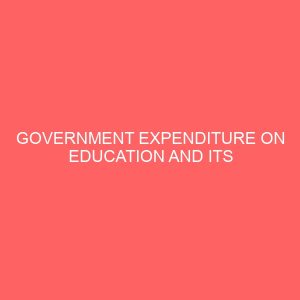
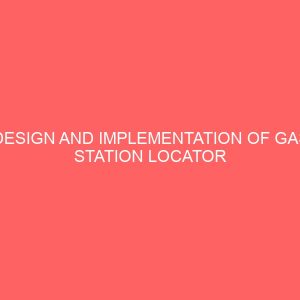

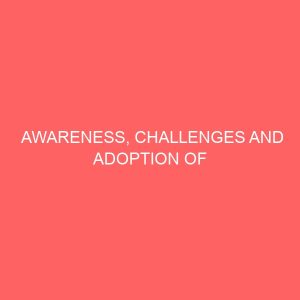
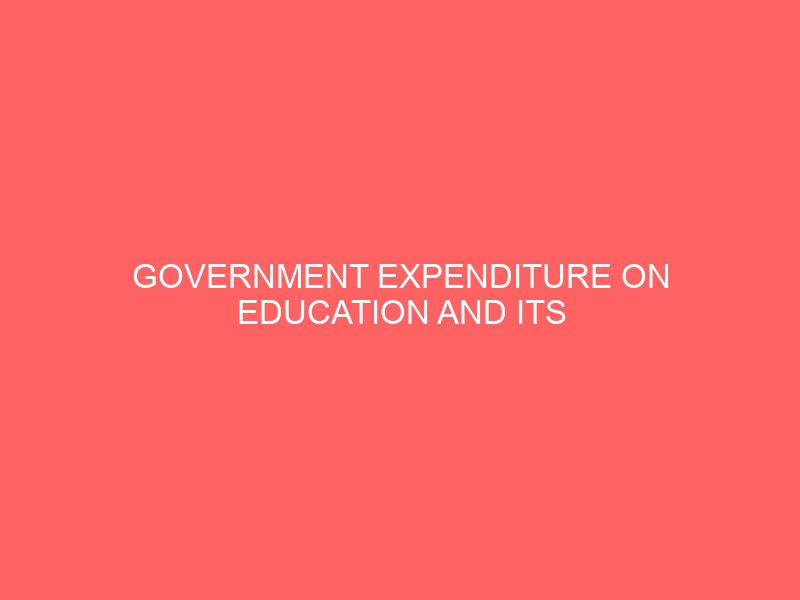
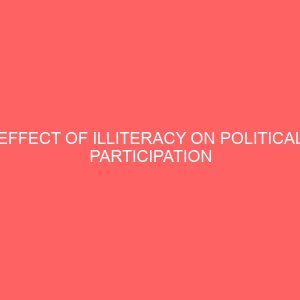
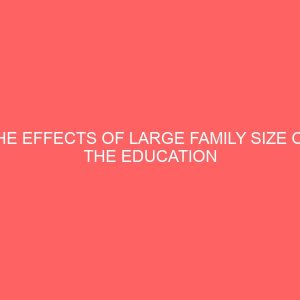
Reviews
There are no reviews yet.